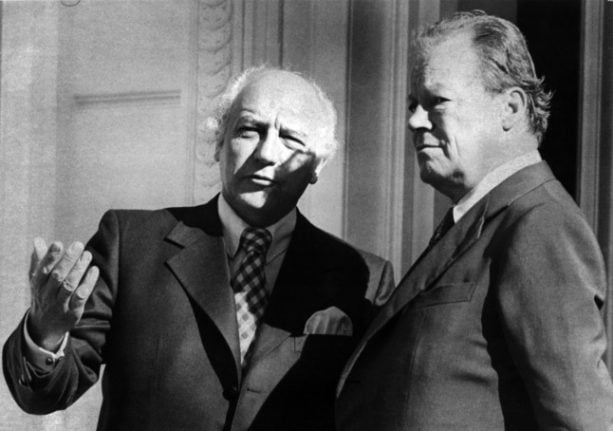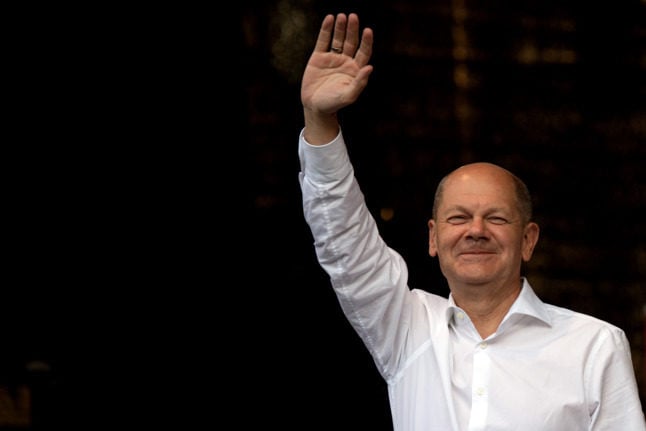Predicting the future is always a tricky business. Just ask Emperor Wilhelm II of Germany, who gravely underestimated the importance of the automobile (“Merely a temporary phenomenon; I still believe in the horse”) and, of course, failed to foresee his own downfall.
German political leaders today are far more guarded in their pronouncements about the future, especially their own, as the sphinx-like answers given by Olaf Scholz and Christian Lindner about options for forming a government after the results of Sunday’s election show. After all, they are aware – painfully so – of just how complicated election aftermaths in the Federal Republic can be.
So we journalists, too, should be careful about predictions. Then again, as the saying goes: “No risk, no fun!” And there are some things that are so certain to happen this Sunday that they are more statements of the obvious than predictions. Let me run you through them – and give you the vocab you need to follow proceedings.
1. No party will have a clear, immediate mandate to lead a government.
It is highly unlikely that any of the three parties who have been consistently ahead in the polls – CDU, SPD, Greens – will get over 30 percent of the vote and highly unlikely that there will be a spread of over 10 percentage points between their scores.
In fact, the most likely outcome is that all three will fan out around the 20 percent mark: 25 percent will be enough to be the largest party. If, however, the second-largest party is at 23 percent and the third largest is at 20 percent, then this 25 percent doesn’t exactly represent a resounding an unambiguous mandate from the electorate – the hallowed klarer Regierungsauftrag.
2. The lack of a clear mandate won’t stop the two largest parties from claiming that they have one.
Around election time, political commentators in Germany frequently state that it is tradition/an unwritten law/just simple good manners for the second-largest party to give the largest one first crack of the whip at forming a government. You will read or hear this several times between now and Sunday evening. This precept is, however, wishful thinking at best.
READ ALSO: Germany gets ready for election that will mark the start of a new era
That’s because there is also a tradition of second-largest parties immediately manoeuvring to form a government after elections to the Bundestag – and no law or taboo against them doing so. Manners didn’t stop Willy Brandt (SPD) and Walter Scheel (FDP) forming a government in record time after the 1969 election, for instance.

Though the CDU/CSU came out on top in the 1969 elections, the SPD's Willy Brandt and FDP's Walter Scheel rushed to form a coalition and snatched victory from the jaws of defeat. Photo: picture alliance / dpa | Peter Popp
They also didn’t stop Gerhard Schröder and Franz Müntefering (SPD) trying to form a government in September 2005. In both cases, the SPD was behind the CDU, but by small enough margins to make it seem credible that they could govern.
So it would be a minor miracle if, on Sunday evening, either the SPD or the CDU (likely to be the first and second-largest parties) were to immediately “admit defeat” – Niederlage einräumen, which means just that, is the phrase which political commentators won’t have occasion to use here – and say they don’t have a mandate to govern.
READ ALSO: TIMELINE: How Germany’s ‘Super Election Day’ is set to unfold
There’s a reason, by the way, that the “It’s an unwritten rule that the largest party…”-myth is generally peddled by commentators whose personal politics are right of centre: in 16 out of 19 elections to the Bundestag, the CDU/CSU has been returned as the largest parliamentary grouping.
3. The SPD will have the slightly stronger hand.
The actual tradition about which party has the most legitimacy to form a government is slightly more complicated than pundits claim: the largest party does indeed tend to end up leading a new administration – unless, however, it has lost vote share while the second-largest party has gained.
The SPD formed a government in 1969, when it came second, but gained 3.4 percent while the CDU lost 1.5 percent; it didn’t lead the administration in 2005, however, when came second and lost 4.3 percent. Losing vote share as the incumbent is referred to as abgewählt werden.

Even if the Union remains the largest party, any increase in vote share will allow the SPD to claim victory. Photo: picture alliance/dpa | Federico Gambarini
Expect to see this argument being levelled at the CDU – even if it does actually come in first. That’s because even being the largest party with 25 percent of the vote would still represent -7 percent off its 2017 result, while anything above 20.5 percent would see the SPD having gained.
Being abgewählt worden doesn’t, however, necessarily translate into leaving government. In 2017, both the CDU and the SPD lost vote share – to the tune of a whopping -8.6 percent and -5.2 percent – and yet still ended up continuing in government together.
4. All of this will be thrashed out in excruciating detail by bad-tempered, exhausted politicians live on Sunday evening
Given that German elections actually seldom produce results which offer immediate clarity and that so many parties are now in the mix, there is no (increasingly wobbly) tradition of “the concession speech” as there is in the UK or the USA.
Germany actually has something far more entertaining/soul-destroying (delete as appropriate to your level of interest in politics): the election-night post-mortem. Called the Elefantenrunde (literally “elephants’ round”), this is where all the candidates take part in a live televised mélée in which they try to push their interpretation of the election results.

Candidates gather at the 'Elephants' Round' after Thuringia's state elections in 2019. Photo: picture alliance/dpa/dpa-Zentralbild | Martin Schutt
In terms of its cringe factor and the predictability of its participants’ shtick, it’s like reality TV – but with actual reality. The first rule of Elephantenrunde: alpha-male types generally overdo it and end up looking foolish. Most famously, this happened to Gerhard Schröder in 2005, whose overly-brawny approach is widely considered to have cost him any remaining possibility of staying on as Chancellor.
The second rule of Elephantenrunde: the coalition that the disgruntled SPD candidate categorically rules out is almost always the coalition that ends up happening. Once again, Schröder in 2005 is a classic example (famous last words here); in 2017, Martin Schulz went into the Elephatenrunde stating that the SPD would be going into opposition and would definitely not be going into another Grand Coalition (cue canned laughter).
READ ALSO:
- From Kenya to Jamaica: Which coalitions are possible after the German election?
- ANALYSIS: Who could be in Germany’s next coalition government?
The third rule of Elephantenrunde: the smaller parties who don’t have to actually have to lead coalition negotiations sit back, chuck in the odd verbal hand grenade, and have a good old laugh. The FDP generally brings the popcorn.
So this Sunday, expect Christian Lindner to be sat there grinning like a Cheshire cat while Armin Laschet falls into the role of the mortally wounded big beast.
And if Olaf Scholz says anything even approaching the following, get ready for yet another GroKo: “Die Union ist abgewählt worden. Herr Laschet muss eine Niederlage einräumen. Der Wählerauftrag ist klar: Es darf keine weitere Große Koalition geben.“ ("The Union has been voted out. Mr Laschet must admit defeat. The demand of the voters is clear: there can be no more grand coalitions.")

Comments